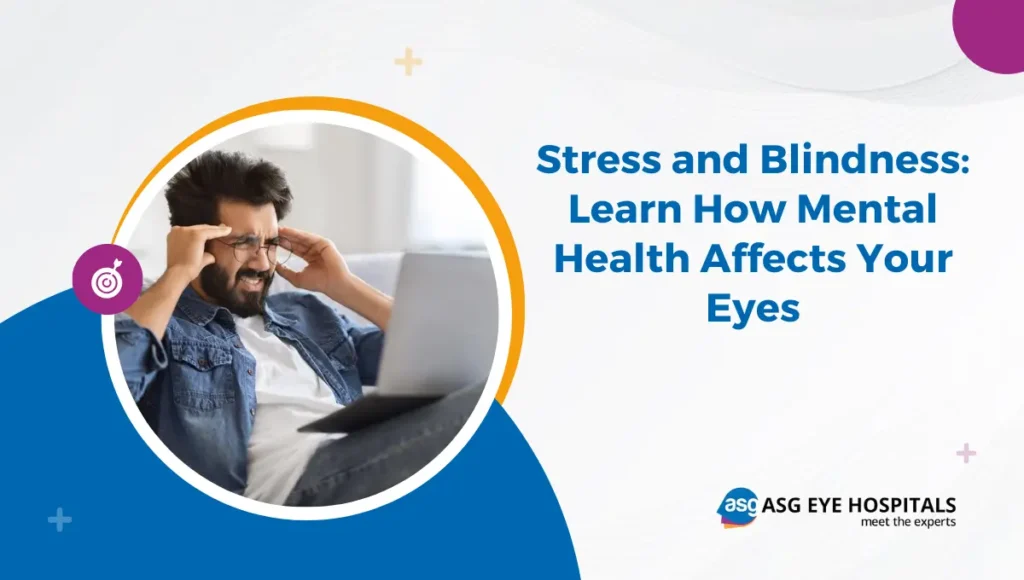Everyone experiences stress to some extent. Stress follows us like our shadows at dusk, whether it’s from personal challenges, work pressure, or the expectations of modern society. Researchers have shown that stress hurts the mind and emotions, but they sometimes forget about how stress impacts vision.
The Link Between Stress and Vision Loss
Did you know that the human body has stress-reduction systems built right in? For example, the body goes into “fight or flight” mode in stressful situations, directing energy toward defending against an attack or fleeing the danger. But even with these innate defenses, 74% of individuals find it difficult to handle severe pressures in their daily lives.
Constant exposure to stressors damages health in a variety of ways, including resulting in hypertension, insomnia, weight gain, memory loss, and much more. Even worse, studies discovered that high-stress levels could cause visual impairments.
How Our Vision Gets Affected Due to Stress:
- Dual vision: Tensed muscles in and around the eyes can be brought on by stress, which can produce distortion, double vision, or hazy vision by impairing the lens’s ability to focus.
- Eye strain: Stress can also result in eye strain, even though it is caused by continuous, intense eye-straining activities like staring at a computer screen for extended periods.
- Stress has the potential to increase your eye’s sensitivity to light. In extreme situations, you could feel discomfort in your eyes.
- Eye floaters: Stress can cause little spots to appear all over your vision in addition to causing eye strain and light sensitivity.
- Twitching of the eyes: Tension can cause involuntary contractions of the muscles, including those that govern eye movement. This can cause your eyes to twitch, a disorder called myokymia.
- Tunnel vision: Extended stress may occasionally impair your peripheral vision. When you have tunnel vision, your eyes can only directly focus on what is in front of you.
Can Stress Cause Vision Loss
There is a complicated link between stress and eyesight loss. Stress may not be a direct cause of vision loss. It can exacerbate existing vision issues and result in impairment.
Specifically, the following mental stressors can exacerbate visual issues
Anxiety: if you are extremely or continuously stressed and anxious. Your body’s increased adrenaline levels can cause pressure on your eyes, causing blurred vision due to stress.
Depression: A study published in JAMA Ophthalmology discovered a strong correlation between depression and loss of vision function.
These results are supported by research from the Centers for Disease Control and Prevention, which shows that 1 in 4 adults with visual loss experience loneliness, sadness, or anxiety.
Symptoms of Depression and Anxiety
Fortunately, controlling mental stress typically also reduces the signs and symptoms of stress-related eye issues. However, we must first recognize the signs of mental stress before we can treat it.
If you have any of the following symptoms on a daily or frequent basis, you may have general anxiety:
- Excessive concern that is difficult to manage
- Inability to concentrate
- Difficulty falling asleep, especially if you had a restless night before
- Feeling tense or restless all the time
- Being easily enraged or irritated, especially over trivial issues
The following are some typical signs of depression:
- A constant feeling of sadness, worthlessness, or powerlessness
- Lacking interest in any pastimes or pursuits
- Exhaustion or low energy, despite getting ample sleep and rest
- Changes in appetite and weight
- Battling persistent thoughts of harming oneself
Preventive Measures and Coping Strategies:
Stress Management Techniques : Incorporating stress management techniques such as meditation, deep breathing exercises, and mindfulness can help alleviate stress. Those practices can positively impact both mental well-being and eye health.
Regular Eye Exams : Routine eye examinations are crucial for detecting and addressing potential issues early on. Regular check-ups allow for the monitoring of eye health and the implementation of preventive measures.
Healthy Lifestyle Choices : Adopting a healthy lifestyle, including a balanced diet, regular exercise, and sufficient sleep, contributes to overall well-being, benefiting mental and eye health.
Screen time management.
In the digital age, excessive screen time can strain the eyes. Implementing the 20-20-20 rule (taking a 20-second break every 20 minutes and looking at something 20 feet away) can alleviate eye strain.
As we navigate the challenges of modern life, it’s important to recognize the interconnectedness of our mental and physical well-being. Stress, a common companion in our daily lives, can significantly impact our eyesight. By prioritizing stress management and adopting healthy lifestyle choices, we can safeguard our vision and promote a holistic approach to well-being. Regular eye check-ups and self-care practices can go a long way in preserving the health of our eyes and, by extension, our overall quality of life.




